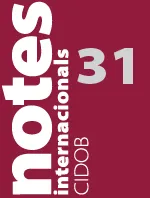The Nazarbayev consensus and its limits. Kazakhstan: An irreversible road to democracy?

Notes internacionals CIDOB, núm. 31
Nicolás de Pedro, Researcher CIDOB
In the election held on April 3, Nursultan Nazarbayev has been reelected President of Kazakhstan with an overwhelming 95.5% of the vote. As on previous occasions, the elections were not recognized as free and fair by the electoral observation mission of the OSCE (Organization for Security and Cooperation in Europe). Nevertheless, criticism, whether internal or external, has been scarce. Local opposition is limited and circumscribed to activities in favor of civil rights and to certain economic and intellectual elites concentrated, for the most part, in Almaty, the former capital. The international community, for its part, has supported, with more or less enthusiasm, the concession of a new term to President Nazarbayev by means of these early elections. The Kazakh President is a skillful manager of his foreign relations and, once again, the international dimension has been favorable to the consolidation of his regime. And this in the context of the revolts that are shaking up the Arab world and raising doubts about the suitability of supporting authoritarian regimes. However, a similar revolt is highly unlikely in the present-day Kazakhstan context. Popular support for the President is genuine. The prevailing economic prosperity and political stability are the principal endorsement of Nazarbayev before his citizens and also, by extension, vis-à-vis an international community worried by the gloomy outlook for the apparently stable, but foreseeable conflictive Central Asian Republics.
Still and all, here as in the rest of the former Soviet space, implicit in this excessive presidential power is the weakness of the local political system. Personalization and the concentration of power in the hands of Nazarbayev entail an institutional fragility that generates uncertainty and implies risks. Some of these risks could even curtail the more ambitious perspectives for Kazakhstan’s immediate future, perspectives which the Astana government feeds internationally by means of costly publicity and public relations campaigns. In an article published in the Washington Post three days before the elections, the Kazakh president went over the achievements of his country under his leadership and the grand expectations he harbored for a greater economic and social development in the current decade, while establishing as irreversible the country’s road to democracy. Despite the certainty that the President seeks to transmit, many questions remain. What does Nazarbayev mean by democracy? Is the Kazakhstani political model sustainable?
Chronicle of an Early Election
On December 23, 2010, a group of citizens from Ust Kamenogorsk, a mining city in the northeast, proposed to hold a referendum to extend the presidential term to 2020. The proposal initially garnered the support of the Assembly of the People of Kazakhstan and of the presidentialist party Nur Otan. Within just two weeks, the promoters of the initiative managed to collect more than 5 million signatures in support of the referendum. In a parallel direction, the Mazhilis, the local Lower Chamber, pushed for the introduction of a constitutional amendment that would allow for the extension of the presidential term. Apparently against the wishes of Nazarbayev himself, who referred the issue to the Constitutional Council, which, by late January, ruled against a possible referendum. In light of the situation, Nazarbayev proposed to hold early presidential elections as a solution in accord with the constitutional framework and able to offer a response both to popular demand and that of the Parliament.
(...)